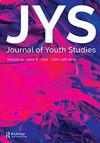The gendered district effect: psychosocial reasons why girls wish to leave their rural communities
IF 2.2
3区 社会学
Q1 SOCIAL SCIENCES, INTERDISCIPLINARY
引用次数: 0
Abstract
The rural youth exodus has mostly been explained with the pull of the city. In this mixed-method study, we explore whether young people also experience a push to leave the rural community due to a lack of psychosocial thriving. The quantitative analysis of the Ungdata-survey among young people aged 13–16 years (n = 141,058) shows that girls imagine leaving more than boys, and also fare worse on many indicators for psychosocial well-being. There is a linear decline in girls’ psychosocial well-being the less centrally they live. We call this the gendered district effect. Contrary to expectations, we find that rural girls without higher education aspirations are those who least want to stay in the rural community. It is likely that a lower degree of psychosocial well-being is part of the reason that more girls in rural areas wish to leave their homeplace. The qualitative analysis of the rural village of Smallville (n = 21) explores this, showing that girls commonly wanted to leave to escape a toxic social environment, which also offered few status-filled work opportunities in the village. The girls were more affected by the rural community's restricting social norms, leaving girls with poor self-images and the wish to leave.性别地区效应:女孩希望离开农村社区的社会心理原因
农村青年的出走主要被解释为城市的吸引力。在这个混合方法的研究中,我们探讨了年轻人是否也经历了由于缺乏社会心理繁荣而离开农村社区的推动。undata对13-16岁年轻人(n = 141058)进行的定量分析显示,女孩比男孩更想离开,而且在许多心理健康指标上表现更差。女孩的生活越不集中,她们的社会心理幸福感呈线性下降。我们称之为性别地区效应。与预期相反,我们发现没有接受高等教育愿望的农村女孩是最不愿意留在农村社区的。社会心理健康程度较低可能是农村地区更多女孩希望离开家乡的部分原因。对Smallville村(n = 21)的定性分析探讨了这一点,结果表明女孩普遍想要离开,以逃离有毒的社会环境,这也使得在村庄里很少有充满身份的工作机会。这些女孩更多地受到农村社区限制的社会规范的影响,使女孩的自我形象不佳,并希望离开。
本文章由计算机程序翻译,如有差异,请以英文原文为准。
求助全文
约1分钟内获得全文
求助全文
来源期刊

Journal of Youth Studies
SOCIAL SCIENCES, INTERDISCIPLINARY-
CiteScore
5.00
自引率
10.50%
发文量
82
期刊介绍:
Journal of Youth Studies is an international scholarly journal devoted to a theoretical and empirical understanding of young people"s experiences and life contexts. Over the last decade, changing socio-economic circumstances have had important implications for young people: new opportunities have been created, but the risks of marginalisation and exclusion have also become significant. This is the background against which Journal of Youth Studies has been launched, with the aim of becoming the key multidisciplinary journal for academics with interests relating to youth and adolescence.
 求助内容:
求助内容: 应助结果提醒方式:
应助结果提醒方式:


